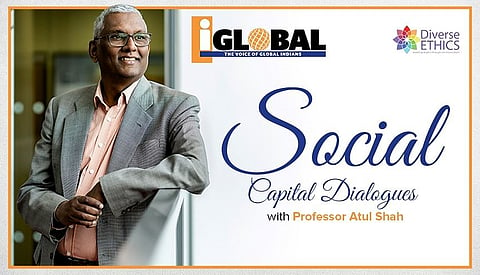

The social sciences have been significantly revolutionised by a breakthrough recent book by world famous anthropologist the late David Graeber and archaeologist David Wengrow called ‘The Dawn of Everything – A New History of Humanity’ and published worldwide by Penguin in 2021. One of the central arguments in the book is that the so-called European Enlightenment was not all made in Europe – in fact it came from encounters with others, including Native Americans and Indians. This echoes the recent book by William Dalrymple, ‘The Golden Road’, who gives significant credit to India and its much earlier enlightenment.
One of the most interesting arguments in the book for me is how for a long time in human history, peace was the norm, and that there were many diverse cultures and communities who chose not to overpower and enslave others. They were often wise, inclusive of people, animals and nature, non-discriminatory, and did not depend on private property or money to rule their lives. They were much happier as a result, had huge respect for ancestors, and developed systems of belief which were cosmological, and understood the need to respect nature, rivers, mountains and the solar system. In stark contrast, European cultures tended to be hierarchical, individualist, materialist, aggressive and obsessed about power and control over others.
What readers of this column may not know is that if any of our young people decide to pursue the social sciences, whether it is economics, sociology, politics or business studies, the norm and baseline will be European philosophy and Values of utilitarianism, liberalism and independence. These frameworks are counter-cultural to our Dharmic worldview. They are so deeply embedded in the social sciences, that to pass an exam or get a good grade, it is rarely possible to challenge these core theories and frameworks. If we are not careful, we get ‘converted’ to such cultural values and beliefs, and in areas like Economics, there is evidence to show that students who graduate start behaving like their theories – greedy, selfish, cold and calculating. Yes, they could even get a First Class in greed.
MORE LIKE THIS…
What is so empowering about the research by Graeber and Wengrow is that it also exposes significant social experimentation and innovation done by these ‘indigenous’ cultures which have a lot of relevance for the problems of today. From very simple examples like how community defeats loneliness; to the joy of festivals and collective rituals; the deep insecurities caused by a materialist society; and how many times humans chose not to exploit their power and instead care and nurture others; we have hope for much more moral, responsible and creative social sciences in the future.
As we prepare for Diwali, the light which removes all darkness, I ask: What if case studies from our communities and festivals become common in the sociology curriculum? How about our small businesses as role models for contented and caring entrepreneurship? And what about the buckets of volunteering that we do which helps all of us keep a distance from money and selfishness, preventing them from overwhelming our lives? We are often ready and willing to give the most expensive thing in modernity – our time. We also understand the true meaning and joy of selflessness.
MORE LIKE THIS…
I have already started this bandwagon of transforming Business Education. Please join me, and encourage the wealthy to support such selfless research, which will benefit all of us, and transform the public understanding of Dharma and Economics too.
Professor Atul K. Shah [@atulkshah] teaches and writes about Indian wisdom on business, culture and community at various UK universities and is a renowned international author, speaker and broadcaster.